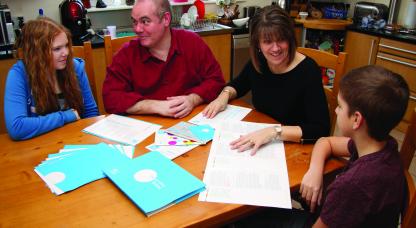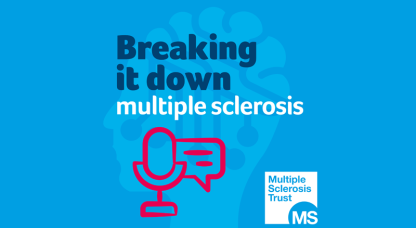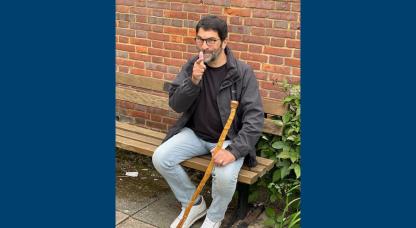How your children will cope with your MS, is an ongoing concern for the majority of parents following diagnosis. Here Martin Baum, who was diagnosed with MS over 20 years ago and his son Josh, discuss how they coped and the impact it has had on them over the years.
Many years ago, when our son was about four or five, my wife and I were given a booklet. It was called, I think, My dad has MS, or something like it. It was a guide to help a child understand the complexities of having a parent living with Multiple Sclerosis.
As far as it went, it did exactly what it said on the front cover by explaining about the effects of MS in a child-friendly way. This was something we appreciated greatly. After that life, as they say, carried on while we tried our best not to make a big deal about my relapses no matter how much my MS was impacting upon our family life,
The last thing we wanted to do was to add to his growing pains. Life’s hard enough for a child as it is but, nevertheless, we never hid anything. We tried to be as honest as we felt we could about why dad didn’t go bike riding or have a kick around in the garden. This was his normality. This was our reality.
He didn’t panic whenever I had a tumble or dropped things. Or even when I sounded punch-drunk. He was very accepting because he trusted us. Although I was reluctant to use my walking stick as and when I needed it, I needn’t have worried.
As far as he was concerned, the folding walking stick I used back then was really cool.
It wasn’t until we were in Menorca on holiday when he was eleven that we realised just how clued-up he was. We went to a restaurant by the quay. As we entered, I lost my balance and ended up in the arms of a waiter. As if that wasn’t bad enough, my speech was slurring, giving the impression that I was just another drunken Englishman abroad.
Although this wasn’t anything he hadn’t seen before, what our son did outside the restaurant after we had paid the bill and left, was something that my wife and I have never forgotten to this day; he was walking around a series of shallow humps along the quayside outlining a succession of figure of eights with his footsteps.
He wanted me to join in and when I asked him why he said he wanted to test my motor skills. My motor skills? At the age of eleven? Where did that come from? My wife and I were amazed. Whatever conversation we’d had with him over the years we’d never gone into that kind of detail because we never thought it was necessary.
For us, having an in-depth parental chat about body movement and coordination was something we had always felt was too much information for a child to take in. Our child, on the other hand, had clearly thought otherwise, and he concluded from our little ‘experiment’ that my balance was weaker on the right hand side, which has always been the case. It just goes to show how we should never underestimate the level of understanding that kids demonstrate. I know I did.
Looking back at his childhood and his father’s MS Josh says:
I’ve never known my dad to be anything other than how he is; he’s just my dad, but he’s got MS.
I’ve always known he was different to my friends’ dads, as he wasn’t able to be as active as they were. But instead we’ve always done other things together - we both support Arsenal and enjoy going to matches, we’ve worked on joint writing projects together, and we have major discussions and debates on anything from politics and music to the best kind of razor to use! The most important thing dad has taught me is to have patience, as I would say that’s the most vital requirement in living with a parent with MS. Be patient with their memory lapses, their wobbles, and don’t take it personally if arrangements go awry at the last minute because they’re not well enough. My dad has enough to contend with, the least I can do is try to understand and not make life harder. It’s made me so much more aware of, and sensitive to, the frailties of others though and I like to think it’s helped give me a better perspective on those less fortunate than me.




